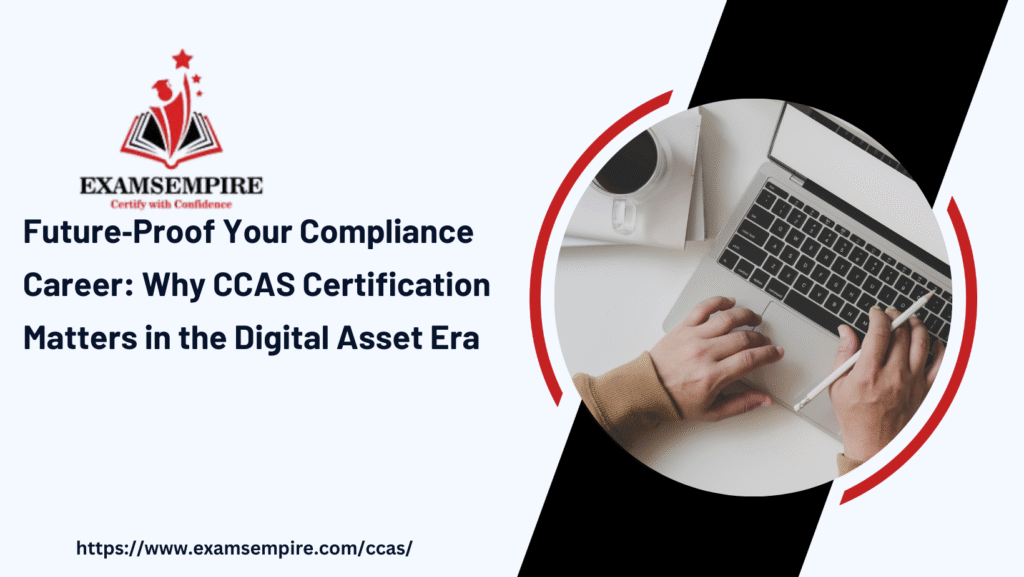In today’s rapidly evolving financial ecosystem, cryptoassets are more than just niche instruments—they are reshaping how we think about money, regulation, and financial crime prevention. The CCAS (Certified Cryptoasset Anti‑Financial Crime Specialist) credential, developed by ACAMS, equips compliance professionals with the critical insights, best practices, and regulatory knowledge needed to combat illicit activity in the digital asset space.
What Is the CCAS Certification?
The CCAS certification is intended to prepare anti‑financial crime (AFC) professionals for challenges unique to the cryptoasset sector. It emphasizes:
- How cryptoassets and blockchain function
- AML/CFT controls tailored to digital asset environments
- Monitoring crypto transactions and detecting illicit typologies
- Global regulatory frameworks, particularly FATF guidelines
Geared toward compliance officers, risk professionals, exchange operators, and law enforcement alike, the CCAS bridges traditional AML disciplines with emerging technologies and risks.
Exam Structure & Eligibility
- Format: Typically consists of 100 multiple-choice and multiple-select questions
- Duration: Around 175 minutes (~3 hours)
- Passing Score: Between 68%–80% depending on provider guidelines
- Eligibility Requirements: ACAMS membership, 18–24 months of relevant AFC experience, and eligibility credits based on training or work history
You can prepare through self-paced study materials or live virtual classes leading up to the exam.
For more information visit us:
https://www.examsempire.com/ccas
Exam Content Overview
The CCAS curriculum typically covers these core areas:
Understanding Cryptoassets & Technology
- Fundamentals of blockchains and distributed ledger technologies
- Types and use cases (e.g., transfers, smart contracts, DeFi)
- Risk vectors tied to anonymity, pseudonymity, and transaction irreversibility
AML/CFT and Regulatory Frameworks
- Global AML standards and FATF recommendations related to virtual assets
- Jurisdictional differences in regulation and enforcement
- EDD (Enhanced Due Diligence), KYC standards, and suspicious activity reporting
Illicit Finance Typologies and Monitoring
- Common patterns: layering, mixing services, darknet markets, ransomware proceeds
- Red flags within crypto transactions
- Tools and techniques for blockchain analytics and transaction tracing
Compliance Risk Management Strategies
- Building policies and control frameworks for Virtual Asset Service Providers (VASPs)
- Transaction monitoring, risk assessments, and audit trails
- Role of machine learning and AI in detection and compliance automation
Tips for Success:
- Utilize official study guides or live classes to structure your learning
- Build familiarity with popular blockchain transaction platforms and analysis tools
- Practice scenario-based questions, which are common in exams and mimic real-world challenges
- Time yourself during mock exams to simulate test conditions

Why CCAS Matters
- Responds to clear demand: Financial institutions and regulators need professionals who can navigate crypto risks
- Adds credibility: Earning the CCAS signals to employers and peers that you understand both digital technology and financial crime frameworks
- Future-proofs your career: As regulations tighten and digital assets proliferate, compliance roles increasingly require digital asset literacy
- Promotes best practice across sectors, from banks to digital exchanges to enforcement agencies
Post-Certification Paths
Once certified, CCAS professionals can:
- Lead AML/CFT compliance for crypto exchanges and custodians
- Advise traditional institutions integrating blockchain payments
- Support regulatory bodies in investigating crypto-linked crime
- Train teams in crypto‑specific typologies and control frameworks
- Stay on the cutting edge of digital asset regulation and risk management
The Certified Cryptoasset Anti‑Financial Crime Specialist (CCAS) certification is more than a credential—it’s a statement that you’re equipped to protect the integrity of evolving financial systems. In an era where digital assets intersect with complex compliance risks, CCAS pdf dumps holders stand out as forward-thinking professionals with both technical and regulatory acumen.
By dividing your preparation into focused steps, practicing rigorously, and thinking in real-world terms, you enter the exam—and your next career stage—ready to make a meaningful impact. Stay informed, stay sharp, and embrace the challenge!

